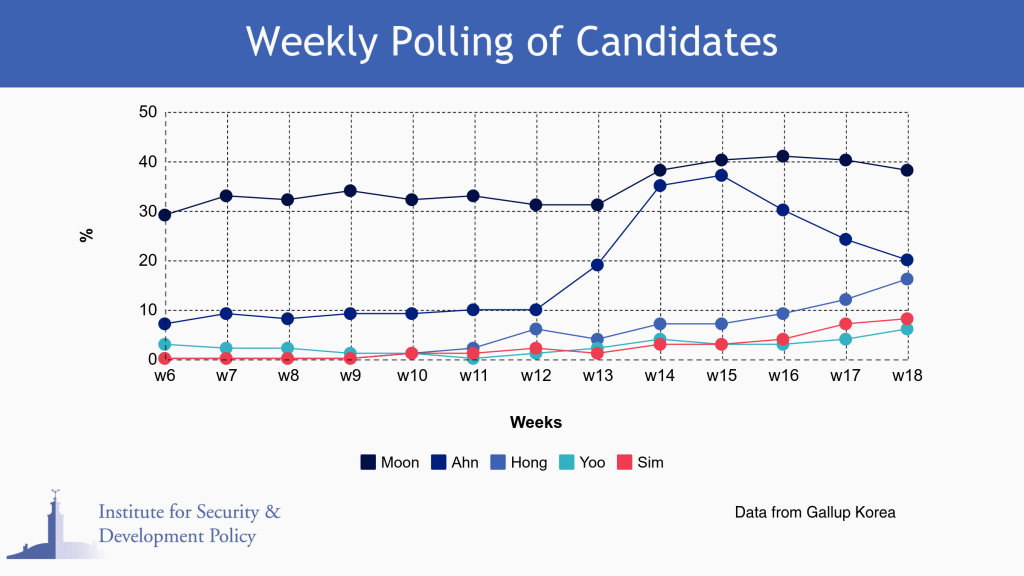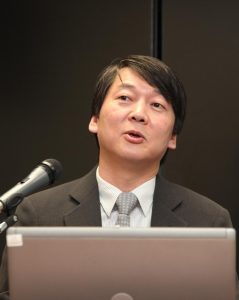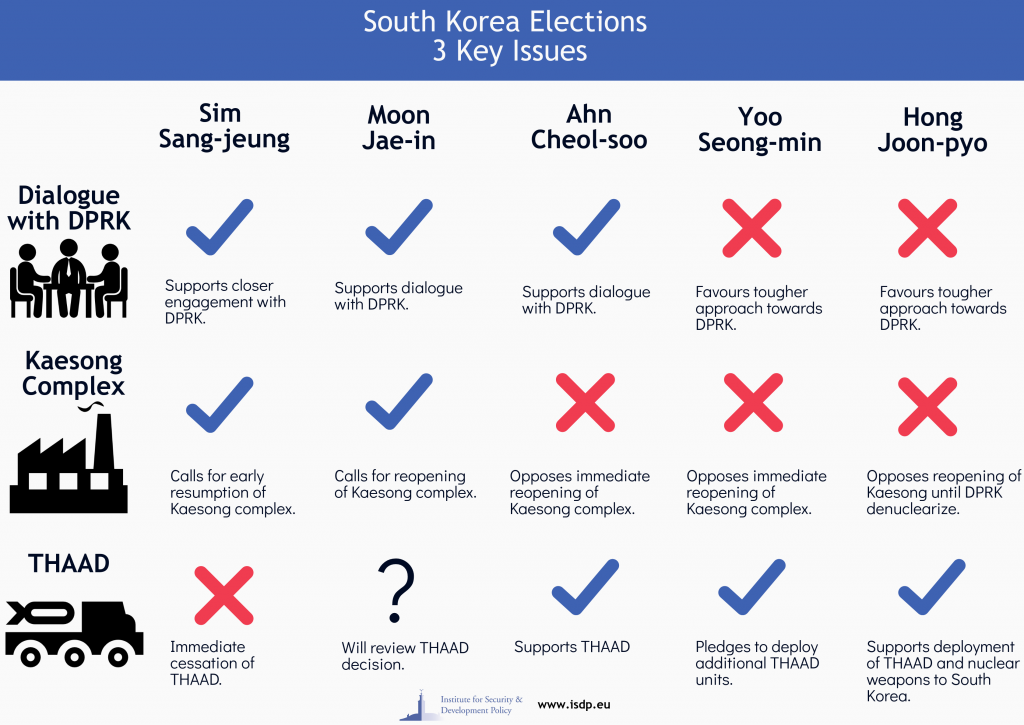South Korea’s Presidential Election: Candidates and Key Policies
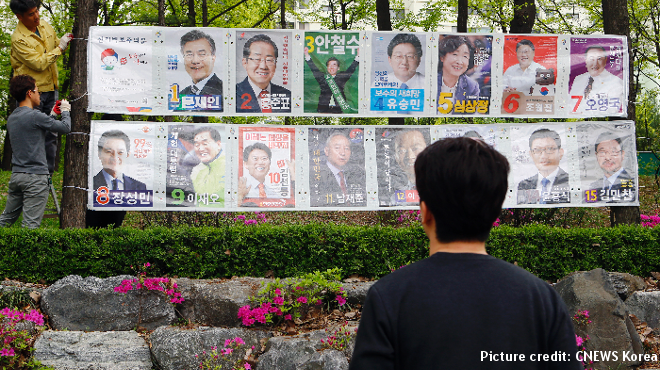
On May 9, South Koreans head to the polls in arguably the country’s most important presidential election for decades. With former President Park Geun-hye impeached in a corruption scandal which saw her removed from office on March 10, parties have had just two months to appoint candidates and outline policy platforms. The challenges awaiting the next incumbent are stiff, top of the list being managing the mounting crisis with North Korea. In this two-part series, ISDP profiles the five presidential candidates and their declared policies, while Dr. Sangsoo Lee outlines five main priorities for the next president.
With the previous ruling Saenuri Party in disarray following Park’s departure, the clear frontrunner in the election is Moon Jae-in, who has dominated most opinion polls for the past few months and posted 38 percent in the latest Gallup survey. Chief of Staff of former President Roh Moo-hyun, known for his “sunshine policy” of closer engagement with North Korea, and ex-leader of the Democratic Party of Korea, Moon Jae-in lost to Park in the 2012 presidential election by just 3 percentage points. His closest competitor is Ahn Cheol-soo of the centrist People’s Party, who posted 20 percent in the same poll. The other candidates are Hong Joon-pyo (Liberty Korea Party) on 16 percent, Sim Sang-jung (Justice Party) on 8 percent, and Yoo Seong-min (Bareun Party) on 6 percent.
Moon Jae-in, 64, Democratic Party
Moon Jae-in officially declared his presidential bid on March 24, vowing to restore justice and national unity, ensure the rule of law, and strengthen independent defense capabilities. With a strong support base in Seoul as well as the second-largest city of Busan, Moon is also popular among younger voters in their 20s to 40s. Occupying political ground left of center, the Democratic Party was the main opposition to the ruling Saenuri Party in the last parliament.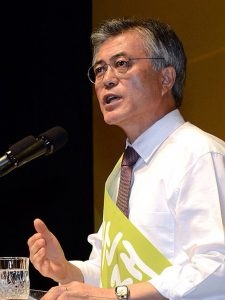
Moon favors closer engagement with North Korea and believes an early reopening of the Kaesong Industrial Complex would contribute to mitigating military tensions and activate economic cooperation between the two Koreas. However, if North Korea carries out a sixth nuclear test as speculated, he has emphasized that cross-border dialogue will be impossible for a time, and given the single, five-year term of a president, it will effectively be difficult to improve inter-Korean ties under the next administration.
Moon is an advocate of an equal relationship between Seoul and Washington, and has called for an early recovery of wartime operational control (OPCON) of South Korean forces. Moreover, he believes the decision on the THAAD deployment should be left to the next administration, though he underscored that if the North carries out a sixth nuclear test, the deployment of THAAD would become inevitable. With regard to the 2015 deal between South Korea and Japan on wartime sexual slavery (also known as the “comfort women” issue), Moon wants to renegotiate the accord to include a more sincere apology from Japan.
On the domestic front, Moon places priority on combating the high unemployment levels – in particular youth unemployment, which stands at 12 percent and growing – and pledges to create 810,000 jobs in the public sector, as well as 500,000 more jobs in the private sector. He also pledges to increase transparency in the management structure of the conglomerates (or chaebol) and to introduce a system to cap household debts and lower the maximum interest rate to 20 percent.
With regard to the Constitutional reform, Moon wants to change the current single, five-year presidential term to a four-year one with the possibility for re-election and a referendum on the revision to be held in tandem with the local elections in June 2018.
Ahn Cheol-soo, 55, People’s Party
Ahn Cheol-soo had been better known as medical doctor-turned-entrepreneur and developer of computer anti-virus software, until he announced his intention to run in the 2012 presidential election (he subsequently stepped aside for Moon Jae-in to boost his vote). Founder of the new centrist People’s Party which won 38 seats in the 2016 parliamentary elections, Ahn became a political star talking about equality and justice and is popular for his searing criticism of the existing political parties and big business.
With Moon taking up the majority leftist vote, Ahn has sought to take advantage of the crisis in Park Geun-hye’s former Saenuri Party by wooing disaffected older conservative voters. While at one point almost neck and neck with Moon in opinion polls, his popularity has dipped somewhat due in part to his perceived poor showing in recent televised debates.
Although Ahn believes engagement with North Korea is to some extent necessary, he opposes an immediate reopening of the Kaesong complex. Despite initially opposing the deployment of THAAD in South Korea, he later reversed his position to argue that the deployment is already underway and that the agreement with the U.S. must be upheld. With regard to the comfort women issue, Ahn calls for a renegotiation of the 2015 deal with Japan.
Ahn has pledged to spend a total of 3 trillion won (about 2.8 billion dollars) during his term to support young employees of small or medium-sized firms to ensure greater income parity with those employed in large businesses. He also plans to push for legal revisions aimed at checking the power of the chaebol and widely implement a penalty system that forces businesses to pay compensation in cases of corruption and other illegal acts.
Regarding Constitutional reform, Ahn wants to institute a government model that decentralizes state powers concentrated in the president, and holding a referendum on such in the 2018 local elections. Moreover, he wants to strengthen the independence of the judiciary by revoking the presidential right to appoint the Chief Justice of the Supreme Court.
Hong Joon-pyo, 63, Liberty Korea Party
Hong Jun-pyo is a former prosecutor, five-time lawmaker, and governor of South Gyeongsang Province. Hong was formerly the chairperson of the Saenuri Party led by Park Geun-hye (known as the Grand National Party to 2012), which again changed name in February 2017, amidst the impeachment crisis, to the Liberty Korea Party. He secured nomination for the party on March 31.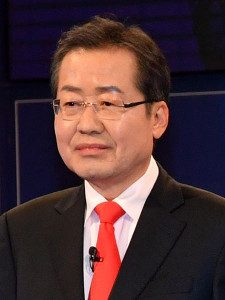
Hong does not support engagement with North Korea and maintains that reopening the Kaesong complex is impossible unless the North completely abandons its nuclear ambitions first. He is the only candidate openly calling for the deployment of U.S. tactical nuclear weapons to South Korea and he strongly agrees with the deployment of THAAD. He also takes a hard line on the comfort women issue, claiming that no deal is possible because sexual slavery is a crime against humanity that is only punishable.
On domestic issues, Hong opposes active government intervention in creating jobs, saying that this should be left to the private sector. However, he believes the government must create a favorable environment for business investment. Moreover, although he claims the chaebol should be punished for their misdeeds, he maintains it is absurd to bash them and demand more jobs at the same time. In regard to Constitutional reform, Hong seeks to reshape the unicameral parliamentary system into a bicameral one.
Sim Sang-jeung, 58, Justice Party
Sim Sang-jeung is the only female candidate in the presidential race. Graduating from the elite Seoul National University, she later devoted herself to labor activism. In 1990, Sim led the foundation of the predecessor to the Korean Confederation of Trade Unions, today one of the largest trade unions in the country. She entered politics in 2004 and has led the Justice Party since July 2015. The party secured six seats in the 2016 parliamentary elections with 7.2 percent of the vote.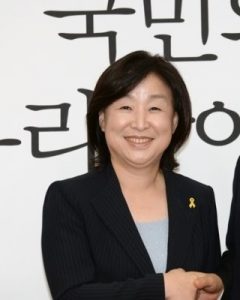
Sim’s Justice Party is the only political party to publicly promote the rights of women and other marginalized groups such as sexual minorities. She is also outspoken about financial reform and critical of chaebol passing on their wealth and control of conglomerates to family members. As a presidential hopeful, Sim has pledged to promote labor rights, reduce working hours, and introduce a social welfare tax.
Sim has argued that that many former South Korean leaders have leaned too much toward the U.S. without a strategy to find a balance between regional powers. She has claimed that despite its security reliance on the U.S., Seoul needs to speak out against it over controversial issues, such as the decision to deploy the THAAD missile system. Sim advocates the denuclearization of the Korean Peninsula, while arguing for an early resumption of the Kaesong complex.
Yoo Seong-min, 59, Bareun Party
A four-term lawmaker, Yoo Seong-min served as Chief of Staff to future President Park Geun-hye in 2005, and was considered her close aide. During the 2012 presidential election, he was one of the key architects of Park’s “economic democratization” policies, which sought to assert tighter control on unfair practices of large businesses and expanded spending on welfare for low-income citizens. However, Yoo is now presidential nominee of the conservative Bareun Party, which broke away from the Liberty Korea Party following Park’s impeachment by parliament in December.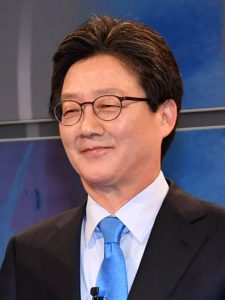
With regard to relations with North Korea, Yoo opposes immediate resumption of the Kaesong complex, as he believes the wages of North Korean workers have been used to finance the regime’s nuclear program. He pledges to deploy additional THAAD units even at the country’s own expense, and has vowed to seek more information sharing and joint decisions on the possible use of U.S. nuclear capabilities in South Korea. On the comfort women issue, he maintains the deal must be renegotiated because the victims themselves did not endorse the 2015 agreement.
Seen as a moderate conservative, Yoo promises to introduce a quota for irregular workers to stop big businesses from exploiting them as a way to cut costs and he pledges to increase the minimum hourly wage. He also vows not to pardon corrupt chaebol and wants to install a special agency tasked with investigating corruption involving public officials. He also seeks Constitutional reform to change the current single, five-year presidency to a four-year one with the possibility for re-election.
Compiled by Eleonora Rossi who is currently completing an internship at ISDP.
Photos are from Wikimedia Commons and Flickr Creative Commons.
